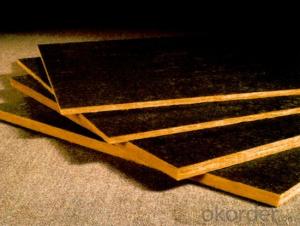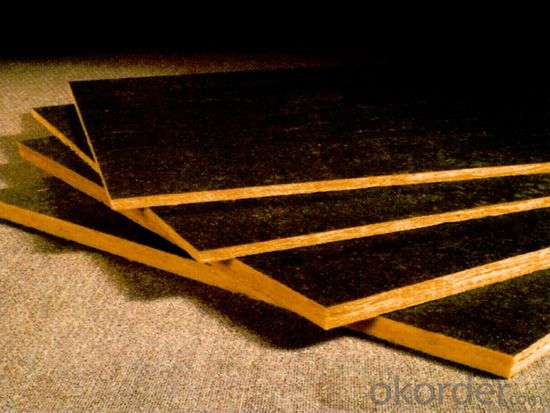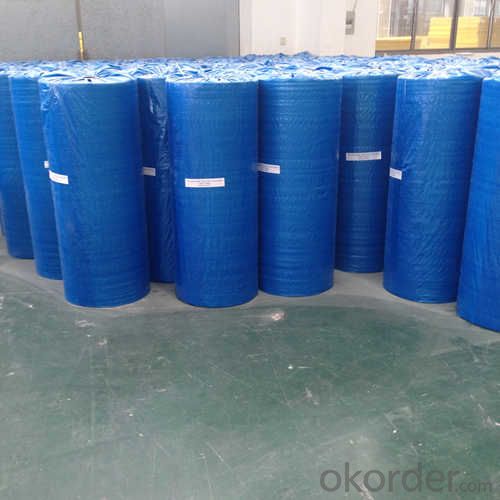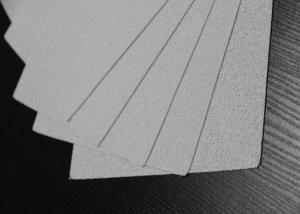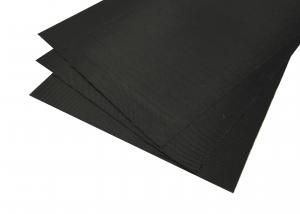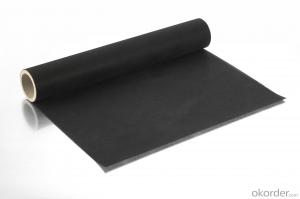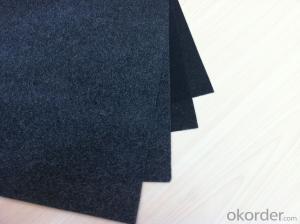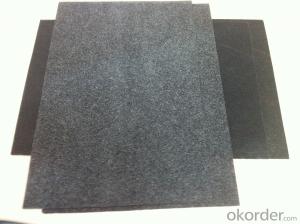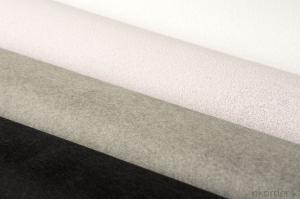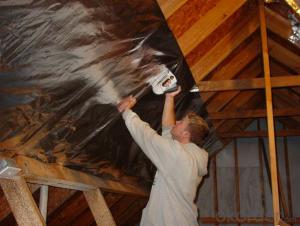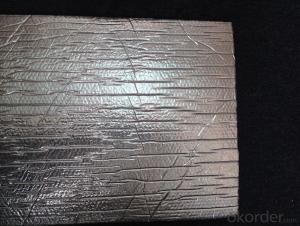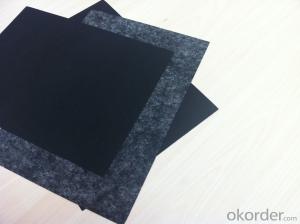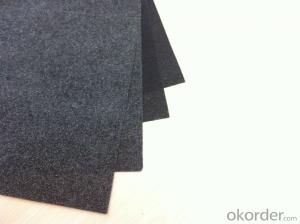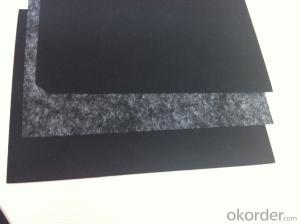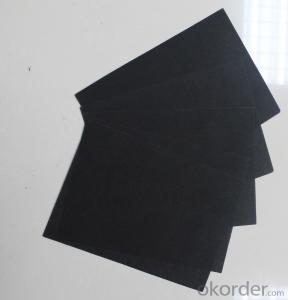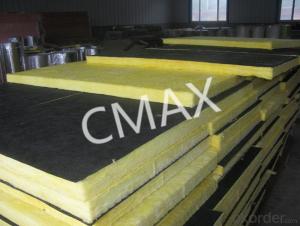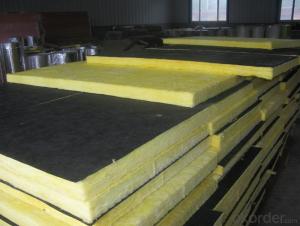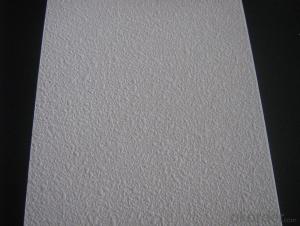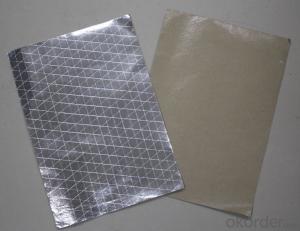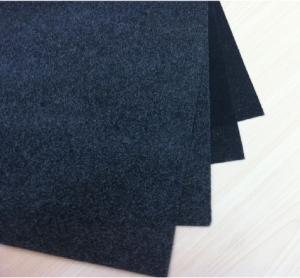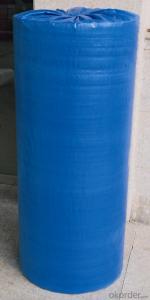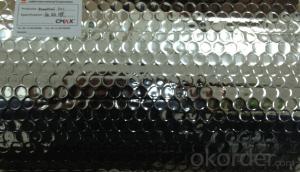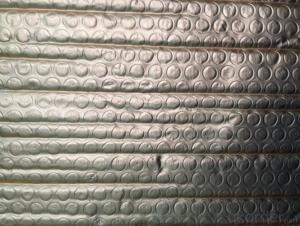Fiberglass Facing Black Fiberglass Tissue for Glasswool Board-60ep
- Loading Port:
- Shanghai
- Payment Terms:
- TT OR LC
- Min Order Qty:
- 500 m²
- Supply Capability:
- 100000 m²/month
OKorder Service Pledge
OKorder Financial Service
You Might Also Like
Introduction of Fiberglass Tissue for Glasswool Board
Fiberglass Tissue is a kind of facing, which is made of by the white fiberglass tissue, and special production process.
Application of Fiberglass Tissue for Glasswool Board
Our black tissue are mainly used as facing for glass wool insulation, rockwool, mineral wool etc. Also fiberglass tissue facing is used under roof decking, under attic rafters, over existing attic thermal insulation, in floors, walls and crawl spaces, and in industrial and commercial buildings to block radiant heat coming into house through the roof during the summer and retain indoor heat generated during in winter
Advantage of Fiberglass Tissue for Glasswool Board
Light weight
• High manufacturing accuracy
• High strength
• Small inertia resistance
• Strong heat dissipation ability
• Good visual effect
Packing of Fiberglass Tissue for Glasswool Board
1. Waterproof paper then PVC shrinking Film
2. Water-Proof film only
3. Woven cloth
4. Kraft paper or Water Proof Film then Metal/wooden pallet
5. (Also as your request. )
Specification of Fiberglass Tissue
Specification | ||
ITEM | UNIT | VALUE |
Type | C | |
Weight | g/m2 | 65±5 |
Thickness | mm | 0.40 |
Tensile Strength MD | n/125px | ≥130 |
Tensile Strength XD | n/125px | ≥90 |
Fiber Diameter | µ | 9 |
Fire Resistant Property | B1 | |
Pictures of Fiberglass Tissue
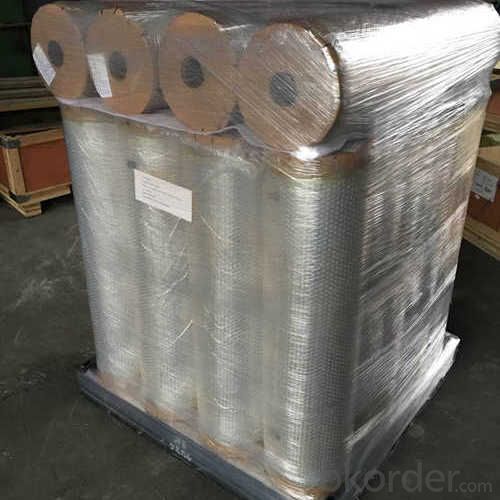
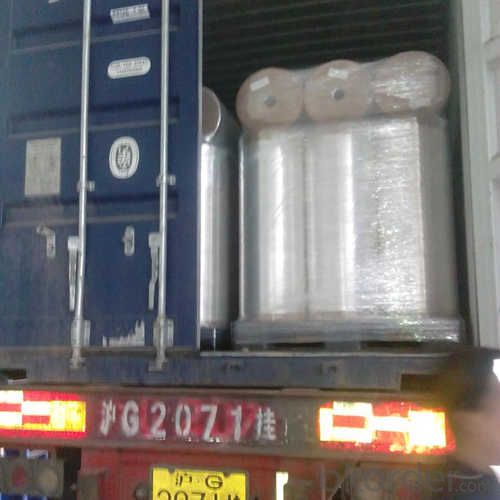
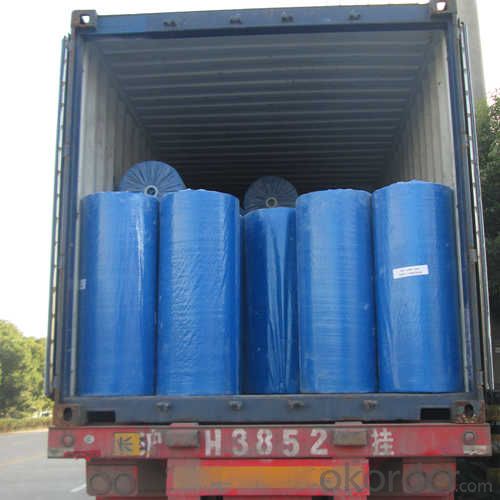
FAQ
We have organized several common questions for our clients,may help you sincerely:
1. What is the storage condition?
The Aluminum Foil Facing should be stored at room temperature and kept from wet and heat source.
2. How to guarantee the quality of the products?
We have established the international advanced quality management system,every link from raw material to final product we have strict quality test;We resolutely put an end to unqualified products flowing into the market. At the same time, we will provide necessary follow-up service assurance.
3. How long can we receive the product after purchase?
In the purchase of product within four working days, we will arrange the factory delivery as soon as possible. The specific time of receiving is related to the state and position of customers. Commonly 7 to 10 working days can be served.
- Q: This question asks about the methods used by manufacturers to maintain the quality of black fiberglass tissue during the manufacturing process.
- <p>Manufacturers ensure the quality of black fiberglass tissue during production through several key steps. They start with high-quality raw materials, such as virgin glass fibers and resins, to ensure strength and durability. They also implement strict quality control measures, including regular testing of the tensile strength, flexibility, and uniformity of the fibers. Advanced manufacturing techniques, such as precision weaving and controlled resin application, are used to maintain consistency in the product. Additionally, environmental controls like temperature and humidity regulation are maintained to prevent variations in the material properties. Finally, post-production inspections and testing are conducted to verify that the final product meets all quality standards before it is released to the market.</p>
- Q: This question asks about the ease of cleaning black fiberglass tissue.
- <p>Black fiberglass tissue is relatively easy to clean, but it requires some care. It can be wiped down with a damp cloth and mild detergent to remove dirt and grime. However, avoid using harsh chemicals or abrasive materials as they can damage the surface. Regular cleaning helps maintain its appearance and longevity. It's also important to dry the surface thoroughly after cleaning to prevent any water damage or mold growth.</p>
- Q: Is it possible to utilize black fiberglass tissue in the manufacturing of furniture?
- <p>Yes, you can use black fiberglass tissue to make furniture. Fiberglass is known for its strength, durability, and resistance to various environmental factors. It's commonly used in outdoor furniture due to its weather resistance. However, it's important to ensure that the furniture design accounts for the material's properties, such as its flexibility and heat resistance. Additionally, proper handling and safety measures should be taken during the manufacturing process due to the potential health risks associated with fiberglass.</p>
- Q: Is it possible to utilize black fiberglass tissue in the creation of garments?
- <p>While it is technically possible to use black fiberglass tissue for clothing, it is not a common practice due to its rigidity and lack of flexibility. Fiberglass is typically used in construction and insulation applications. For clothing, materials that are soft, breathable, and flexible are preferred. If you're looking for a durable fabric, consider alternatives like Kevlar or other synthetic fibers designed for clothing.</p>
- Q: The user is asking if they can repurpose lint from their dryer to create homemade black fiberglass tissues.
- <p>No, you cannot use dryer lint to make black fiberglass tissues. Dryer lint is composed of fibers from clothing and other materials, which are not the same as the glass fibers used in fiberglass production. Fiberglass is made from fine filaments of glass that are combined with a resin to form a composite material. It requires specific manufacturing processes and materials that are not present in dryer lint. Using dryer lint for this purpose would not yield the desired strength, durability, or properties of fiberglass tissues.</p>
- Q: The question asks whether purchasing bulk packs of black fiberglass tissues is more advantageous compared to buying individual boxes.
- <p>Whether it's better to buy bulk packs of black fiberglass tissues or individual boxes depends on your needs and usage. Bulk packs are generally more cost-effective if you use a large amount regularly, as they offer a lower price per unit. However, if you only need a small amount or have limited storage space, individual boxes might be more suitable. Consider factors like storage, usage frequency, and cost per unit to make your decision.</p>
- Q: Is it possible to utilize black fiberglass tape for fixing a leaking faucet or pipe?
- <p>While black fiberglass tape can be used to repair minor leaks in pipes, it is not typically recommended for fixing leaky faucets. For pipes, especially plastic ones, fiberglass tape can create a temporary seal. However, for faucets, plumber's tape (Teflon tape) is more suitable as it is designed to handle the threads and tight seals required in faucet connections. Always remember that for long-term solutions or significant leaks, professional repair or replacement is advisable.</p>
- Q: Is it possible to utilize black fiberglass tissue for creating a wall paneling system in a residential setting?
- <p>Yes, you can use black fiberglass tissue to make a wall paneling system for your home. Fiberglass is known for its durability, resistance to moisture and insects, and it can be an excellent material for wall paneling. It's lightweight, easy to install, and can be painted or finished to match your home's decor. However, ensure that the fiberglass tissue is of high quality and meets safety standards for residential use. Always follow proper installation guidelines and consider consulting with a professional to ensure the best results and safety.</p>
- Q: This question asks for the steps and considerations to properly install black fiberglass tissue to ensure its effectiveness and longevity.
- <p>To install black fiberglass tissue effectively and ensure its durability, follow these steps: 1) Clean the surface to be covered thoroughly to remove any dirt or debris. 2) Cut the fiberglass tissue to the required size, ensuring it fits snugly over the surface. 3) Apply a suitable adhesive, such as epoxy resin, to the surface and fiberglass tissue, following the manufacturer's instructions. 4) Press the fiberglass tissue firmly onto the surface, smoothing out any wrinkles or air bubbles. 5) Apply a protective layer of resin over the tissue to seal and protect it. 6) Allow the adhesive to cure fully as per the manufacturer's recommendations. 7) Regularly inspect and maintain the fiberglass tissue to prevent damage and prolong its lifespan.</p>
- Q: This question asks for methods to determine the cleanliness and dryness of black fiberglass tissue.
- <p>To check if your black fiberglass tissue is clean and dry, visually inspect it for any visible dirt, dust, or debris. Clean tissue should appear free of any foreign particles. To ensure it's dry, you can gently touch the surface; it should feel dry to the touch without any dampness. Additionally, you can use a moisture meter to check for any residual moisture. If the tissue is used in a construction or repair context, it's also important to ensure that no adhesive residue or chemicals remain on the surface that could affect the quality of your work.</p>
Send your message to us
Fiberglass Facing Black Fiberglass Tissue for Glasswool Board-60ep
- Loading Port:
- Shanghai
- Payment Terms:
- TT OR LC
- Min Order Qty:
- 500 m²
- Supply Capability:
- 100000 m²/month
OKorder Service Pledge
OKorder Financial Service
Similar products
Hot products
Hot Searches
Related keywords
